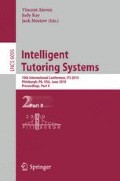Abstract
When our computers act in unexpected (and unhelpful) ways, we become frustrated with them. Were the computers human assistants, they would react by doing something to mitigate our frustration and increase their helpfulness. However, computers typically do not know we are frustrated. This paper presents research showing that user frustration can be detected with good accuracy (84%) using only two types of input data (head tilt and pupil dilation). We also show that reasonable accuracy (73%) can be achieved using only information about head tilt. We then propose how such technology could be employed to reduce learner frustration in adaptive tutoring applications.
Access this chapter
Tax calculation will be finalised at checkout
Purchases are for personal use only
Preview
Unable to display preview. Download preview PDF.
References
Asteriadis, S., Karpouzis, K., Kollias, S.: Feature Extraction and Selection for Inferring User Engagement in an HCI Environment. In: Asteriadis, S., Karpouzis, K., Kollias, S. (eds.) Secondary Feature Extraction and Selection for Inferring User Engagement in an HCI Environment, pp. 22–29. Springer, Heidelberg (2009)
Conati, C., Maclaren, H.: Empirically building and evaluating a probabilistic model of user affect. User Modeling and User Adapted Interaction 19, 267–303 (2009)
Kapoor, A., Burleson, W., Picard, R.W.: Automatic prediction of frustration. International Journal of Human-Computer Studies 65, 724–736 (2007)
Klein, J., Moon, Y., Picard, R.: This computer responds to user frustration: Theory, design, and results. Interacting with Computers 14, 119–140 (2002)
Craig, S., Graesser, A.C., Sullins, J., Gholson, B.: Affect and learning: An exploratory look into the role of affect in learning. Journal of Educational Media 29, 9 (2004)
Barrett, L.: Are Emotions Natrual Kinds? Perspectives on Psychological Science 1, 31 (2006)
Miller, N.I.: The frustration-aggression hypothesis. Psychological Review 48, 337–342 (1941)
Conati, C., Maclaren, H.: Empirically building and evaluating a probabilistic model of user affect. User Modeling and User Adapted Interaction 19, 36 (2009)
D’Mello, S., Graesser, A.C.: Automatic Detection of Learner’s Affect from Gross Body Language. Applied Artificial Intelligence 23, 26 (2009)
Kapoor, A., Picard, R.W.: A real-time head nod and shake detector. In: Kapoor, A., Picard, R.W. (eds.) Secondary A real-time head nod and shake detector, ACM, New York (2001)
Kapoor, A., Picard, R.W.: Multimodal Affect Recognition in Learning Environments. In: Kapoor, A., Picard, R.W. (eds.) Secondary Multimodal Affect Recognition in Learning Environments, p. 6. ACM, New York (2005)
Chumbley, J., Griffiths, M.: Affect and the computer game player: The effect of gender, personality, and game reinforcement structure on affective responses to computer game-play. Cyberpsychology & Behavior 9, 308–316 (2006)
Nopsuwanchai, R., Noguchi, Y., Ohsuga, M., Kamakura, Y., Inoue, Y.: Driver-Independent Assessment of Arousal States from Video Sequences Based on the Classification of Eyeblink Patterns. In: Nopsuwanchai, R., Noguchi, Y., Ohsuga, M., Kamakura, Y., Inoue, Y. (eds.) 11th International IEEE Conference on Intelligent Transportation Systems, ITSC 2008, pp. 917–924 (2008)
Batmaz, I., Ozturk, M.: Using pupil diameter changes for measuring mental workload under mental processing. Journal of Applied Sciences 8, 68–76 (2008)
Waber, B., Magee, J., Betke, M.: Fast Head Tilt Detection for Human Computer Interaction. In: Waber, B., Magee, J., Betke, M. (eds.) Secondary Fast Head Tilt Detection for Human Computer Interaction, pp. 90–99 (2005)
Ince, I., Yang, T.-C.: A New Low-Cost Eye Tracking and Blink Detection Approach: Extracting Eye Features with Blob Extraction. In: Ince, I., Yang, T.-C. (eds.) Secondary A New Low-Cost Eye Tracking and Blink Detection Approach: Extracting Eye Features with Blob Extraction, pp. 526–533. Springer, Heidelberg (2009)
King, L.A.: Visual Navigation Patterns and Cognitive Load. In: King, L.A. (ed.) Secondary Visual Navigation Patterns and Cognitive Load, Springer, Heidelberg (2009)
Author information
Authors and Affiliations
Editor information
Editors and Affiliations
Rights and permissions
Copyright information
© 2010 Springer-Verlag Berlin Heidelberg
About this paper
Cite this paper
McCuaig, J., Pearlstein, M., Judd, A. (2010). Detecting Learner Frustration: Towards Mainstream Use Cases. In: Aleven, V., Kay, J., Mostow, J. (eds) Intelligent Tutoring Systems. ITS 2010. Lecture Notes in Computer Science, vol 6095. Springer, Berlin, Heidelberg. https://doi.org/10.1007/978-3-642-13437-1_3
Download citation
DOI: https://doi.org/10.1007/978-3-642-13437-1_3
Publisher Name: Springer, Berlin, Heidelberg
Print ISBN: 978-3-642-13436-4
Online ISBN: 978-3-642-13437-1
eBook Packages: Computer ScienceComputer Science (R0)

